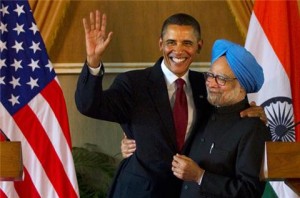The media are focusing a considerable amount of attention on the atmospherics of President Obama’s state visit to India.
They are making much ado, for example, of the fact that the shellacking he took at home in midterm elections last Tuesday meant that Obama arrived in India a few days ago with his tail between his leg instead of exuding the aura that normally accompanies the leader of the free world. And they are practically ridiculing his ad hoc efforts to rebrand his visit as a garden-variety trade mission – in a politically expedient attempt to show disaffected voters back home that his presidency is now all about creating jobs.
Nevertheless, Obama demonstrated the unparalleled power and influence he still wields on the world stage when he declared the following yesterday during an address before a joint session of the Indian Parliament:
The United States not only welcomes India as a rising global power, we fervently support it, and we have worked to help make it a reality. India is not simply emerging; India has already emerged. And it is my firm belief that the relationship between the United States and India – bound by our shared interests and values – will be one of the defining partnerships of the 21st century.
In the years ahead, I look forward to a reformed United Nations Security Council that includes India as a permanent member.
(The Washington Post, November 8, 2010)
 For this declaration was greeted with such celebration, if not vindication, by this nation of over one billion that you’d think the almighty God had proclaimed that the Indians, not the Jews, are His chosen people. Never mind that this was intended as much to help secure a strategic ally for the U.S. in its increasingly bipolar conflicts with China as to recognize India’s emergence as a bona fide world power in its own right.
For this declaration was greeted with such celebration, if not vindication, by this nation of over one billion that you’d think the almighty God had proclaimed that the Indians, not the Jews, are His chosen people. Never mind that this was intended as much to help secure a strategic ally for the U.S. in its increasingly bipolar conflicts with China as to recognize India’s emergence as a bona fide world power in its own right.
It’s worth noting, however, that Obama’s endorsement is fraught with many political minefields. Most notable, of course, is China’s longstanding opposition to India becoming a permanent member of the UN Security Council. And this is compounded by the fact that the U.S. has also endorsed China’s perennial nemesis in the region, Japan, to become a permanent member as well.
Then there’s the fact that India’s perennial nemesis, Pakistan, is now pouting with ally envy. Which means that Pakistan is bound to give the U.S. even more cause to complain about it being an ambivalent partner in the war on terror….
All the same, Obama is navigating these political minefields with the skill of a team leader of Bravo Company in The Hurt Locker.
More to the point, though, notwithstanding China’s opposition or Pakistan’s envy, there’s no gainsaying the geopolitical wisdom of his solidifying ties in this fashion between the U.S., the world’s oldest democracy, and India, the world’s biggest.
NOTE: The mission of the UN Security Council is to maintain international peace and security. It is currently comprised of five permanent members (China, France, Russia, the UK and the US) and 10 non-permanent members elected to two-year terms.
But there have been serious discussions and a lot of lobbying since 1992 to reform the Council by increasing the number of permanent as well as non-permanent members. Unfortunately, given that the UN is the most dysfunctional and feckless body in the world, only God knows when this reform will be enacted.
Not to mention that, as indicated above, there is no consensus among the veto-holding permanent five on how many and, more importantly, which countries should win a coveted seat as a permanent member. For what it’s worth, though, I think India, Japan, Germany, Brazil and South Africa should all be added as permanent members.
Leave a Reply
You must be logged in to post a comment.